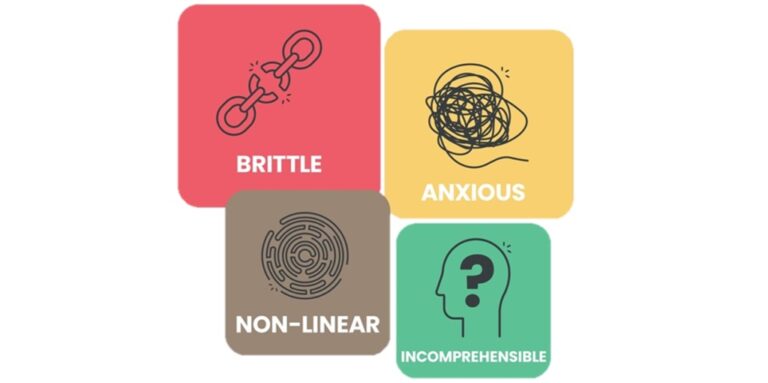VUCA has been a trendy catchall for a rapidly evolving world fraught with volatility, uncertainty, complexity, and ambiguity.
VUCA has been a trendy catchall for a rapidly evolving world fraught with volatility, uncertainty, complexity, and ambiguity.
Then came Covid-19. And in the subsequent global disruption, a new acronym has emerged that better describes today’s world: BANI, which stands for brittle, anxious, non-linear, and incomprehensible.
“The world has rocketed past merely being ‘uncertain’ or ‘volatile’,” explained futurist and writer Jamais Cascio, who coined the term. “In my view, these four concepts give us better language for the ways in which the world today seems to be falling apart.”
Singapore is not spared the BANI effects. Following the Singapore Economic Policy Forum this year, Minister for Education Chan Chun Sing shared in a Facebook post that locals are feeling the pressure from “disruptive technologies, hyper-connectivity, and hyper-competition”.
Navigating this unpredictable landscape as a business leader can be a daunting task. But with the right capabilities and tools, they can thrive in the BANI world.
Peter Senge, from the Massachusetts Institute of Technology Sloan School of Management, argued that to successfully chart the right path amid the chaos, leaders need to create a learning organisation – one that learns, adapts, and grows even in times of uncertainty.
He explained that it is vital to understand how “the problems that are the most vexing, difficult, and intransigent… come about”. His strategy provides leaders with the models and tools necessary to gain a broader perspective of those problems, giving them leverage and insight as to what they could do differently.
At SIM, we view Systems Leadership from three key practices – creativity, understanding complexity, and collaboration. Business leaders who can embrace these practices will be better equipped to navigate the challenges that confront the modern era.
Creativity
A good leader seeks better results or solutions. As Albert Einstein said: “The true sign of intelligence is not knowledge, but imagination.”
Creativity refers to more than just finding new solutions to problems. It is also about actively seeking opportunities to create new and improved ways of doing things.
Leaders should feel comfortable in challenging the status quo and be able to envision and drive positive change in their environment, whether it is by developing a product or establishing a new system of work in the enterprise.
Take the Yellow Ribbon Project (YRP), which was established in 2004 and aims to assist ex-offenders with their reintegration into society, as an example.
Launched by Mr Chua Chin Kiat, then the Director of Prisons, YRP went beyond conventional approaches. Rallying support from government agencies, corporations, and the public, the initiative designed campaigns and events that changed public perception of offenders. Shifting the focus from punishment to acceptance and reintegration, YRP showcases how a clear and compelling vision can transform societal norms and create new opportunities.
Complexity
Unlike those that came before, modern-day challenges each possess deep complexities. From climate change and geopolitical tensions to supply chain disruptions and inflation, business leaders today grapple with an array of interconnected challenges.
The parable of the blind men and elephant illustrates this concept best. The story, which depicts a group of blind men coming across an elephant for the first time, shows how different perspectives can lead to vastly different interpretations of a problem.
The man who felt the elephant’s trunk decided that the animal resembled a club, while the one who felt its leg thought it was similar to a pillar.
To arrive at the best solution, one needs to take the time to understand all perspectives and factors at play. Successful solutions cannot be developed in isolation, but must consider a host of dynamics.
In a world with myriad factors – both internal and external – at play, complexity, like change, is a constant. Leaders must possess systems thinking skills to see the bigger picture in every scenario. These enable them to analyse complex situations, recognise patterns, and make decisions that take into account the broader context.
By addressing the multifaceted challenges ex-offenders face – such as societal stigma, unemployment, and familial relationships – YRP exemplifies this mastery well.
Instead of focusing efforts and resources only on employment assistance, YRP takes on a holistic and nuanced approach to deliver impressive reductions in Singapore’s recidivism rates. From public awareness campaigns and job placement programs to family reintegration initiatives, its various solutions address a wide spectrum of issues faced.
Collaboration
Leaders need to also realise that creative solutions cannot be developed alone. In today’s global, multifaceted economy, collaboration is key. That does not just refer to within an organisation as well. Strong partnerships with external stakeholders are equally important.
For instance, the YRP does not work on its own as it advances its cause. Besides the Singapore Prison Service, it involves a full ecosystem of government ministries, social enterprises, private organisations, and volunteers to drive meaningful change.
One example is its Private Partnership Scheme. As part of its On-The-Job Training Programme, private enterprises set up business operations within the prisons to help inmates receive work experience and necessary training while they serve their sentences. This also provides them with an opportunity to learn teamwork, quality control, and communication – necessary skills for successful employment after their release.
Moreover, the Yellow Ribbon Employer Awards recognises companies that offer jobs and mentorship for ex-offenders, while public events – like the Yellow Ribbon Run – involve the community in celebrating inclusivity.
This cross-sectoral partnership ensures that resources and expertise are effectively aligned, creating a comprehensive support network that bridges institutional and societal gaps. By fostering trust and a shared sense of purpose among diverse groups, YRP demonstrates how collaboration can magnify positive change.
Mastering the 3Cs
SIM’s Systems Leadership foundation programme is designed with the three masteries of creativity, complexity and collaboration in mind. Targeted at business leaders, C-Suite executives, directors, and managers, the two-day course enhances leadership skills not just by instilling knowledge and concepts, but with actionable strategies as well.
This includes developing the communication skills necessary to foster teamwork and generative thinking in the workplace. The refreshed culture cultivated by leaders will help drive progress as it encourages everyone to let go of past ideals and adopt a forward-thinking mentality in identifying fundamental solutions.
“BANI is one great reminder for all of us. We’re living in a world that’s delicate, uncontrollable, unpredictable, and impossible to comprehend,” said Jeroen Kraaijenbrink, a strategy and leadership consultant, in his article on Forbes. “Let’s celebrate, accept, and wonder.”
The SIM Centre for Systems Leadership (CSL) aims to develop and build systems leadership capacity to drive transformational, systemic change for the benefit of current and future generations.
We achieve this by offering professional learning and development programmes, partnering with professionals and enterprises to enhance and apply their systems leadership capabilities for greater individual and organisational success. To learn more, email us at simacademy@sim.edu.sg to arrange a discussion.







